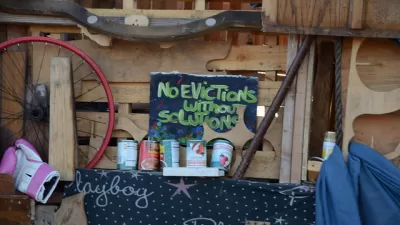Other cities could learn from efforts to lower eviction rates in Charlotte, North Carolina.

When groundbreaking research revealed that evictions in Charlotte, North Carolina are nearly twice as frequent as in similar-sized cities, the University of North Carolina and Mecklenburg County wanted to know more. The two partnered to take a deeper look at the frequency, causes, and impacts of eviction in Charlotte—ultimately motivating the county to devote new resources to legal aid and eviction defense, one step in combatting the crisis.
In hopes of replicating the partnership's success in other cities, Urban Institute's Leah Hendey distilled their work into five basic strategies. Here are a few:
-
The partnership heard from a number of parties involved in the eviction process, including county agencies, nonprofits, legal aid, landlords, apartment associations, and the sheriff's office.
-
They mapped out the entire eviction process, including informal evictions that never make it to court. That helped them identify the most crucial junctures and key opportunities for intervention.
-
They combined awareness with action. Alongside reports on new dimensions of the eviction crisis, the partnership published a "Toolkit for Action." Following the reports, Hendey notes, "the United Way and Mecklenburg County increased their funding for legal assistance for people facing eviction, with the county funding Legal Aid of North Carolina to provide this assistance for the first time in the fiscal year 2019 budget."
FULL STORY: Five ways Charlotte, North Carolina, deepened its understanding of its eviction crisis

Montreal Mall to Become 6,000 Housing Units
Place Versailles will be transformed into a mixed-use complex over the next 25 years.

Planetizen Federal Action Tracker
A weekly monitor of how Trump’s orders and actions are impacting planners and planning in America.

DARTSpace Platform Streamlines Dallas TOD Application Process
The Dallas transit agency hopes a shorter permitting timeline will boost transit-oriented development around rail stations.

Tulsa Paid Remote Workers $10,000 to Move In — Nearly All of Them Stayed
The Tulsa Remote program generated more than $4 in local economic benefits for every dollar spent.

Chicago Transit: $770M Shortfall, 40% Service Cuts Loom
Despite dire warnings from transit officials, the Illinois General Assembly ended its legislative session without a solution.

Without International Immigrants, the Rural US Population Would Be Falling 58%
Census data shows that population growth in rural areas is due in large part to international migrants.
Urban Design for Planners 1: Software Tools
This six-course series explores essential urban design concepts using open source software and equips planners with the tools they need to participate fully in the urban design process.
Planning for Universal Design
Learn the tools for implementing Universal Design in planning regulations.
City of Mt Shasta
City of Camden Redevelopment Agency
City of Astoria
Transportation Research & Education Center (TREC) at Portland State University
City of Camden Redevelopment Agency
Municipality of Princeton (NJ)
Regional Transportation Commission of Southern Nevada




























